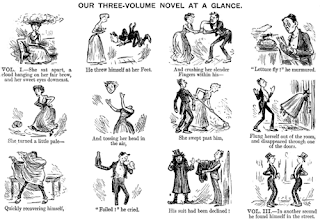A cliché or cliche (UK /ˈkliËʃeɪ/ or US /klɪˈʃeɪ/) is an expression, idea, or element of an artistic work which has become overused to the point of losing its original meaning or effect, even to the point of being trite or irritating, especially when at some earlier time it was considered meaningful or novel.
In phraseology, the term has taken on a more technical meaning, referring to an expression imposed by conventionalized linguistic usage. The term is frequently used in modern culture for an action or idea that is expected or predictable, based on a prior event. Typically pejorative, "clichés" may or may not be true. Some are stereotypes, but some are simply truisms and facts. Clichés often are employed for comic effect, typically in fiction.
Most phrases now considered clichéd originally were regarded as striking, but have lost their force through overuse. The French poet Gérard de Nerval once said "The first man who compared woman to a rose was a poet, the second, an imbecile."
A cliché is often a vivid depiction of an abstraction that relies upon analogy or exaggeration for effect, often drawn from everyday experience. Used sparingly, they may succeed, but the use of a cliché in writing, speech, or argument is generally considered a mark of inexperience or a lack of originality.
Origin
The word cliché is drawn from the French language. In printing, "cliché" (kli-shay) was the sound a printing plate cast from movable type made when it was used. This printing plate is also called a stereotype. When letters were set one at a time, it made sense to cast a phrase used repeatedly, as a single slug of metal. "Cliché" came to mean such a ready-made phrase.
Online Larousse Dictionary suggests that the word "cliché" comes from the verb "clicher" (to attach movable types to a plate), which in turn is an onomatopoeia that imitates the clicking sound made by the printing plates when in use.
Usage
All dictionaries consulted recognize a derived adjective clichéd, with the same meaning. The noun cliché sometimes is used as an adjective, although some dictionaries do not recognize the adjectival sense, only listing its use as noun, and listing clichéd separately as an adjective.
See also
References
Further reading
- Anton C. Zijderveld (1979). On Clichés: The Supersedure of Meaning by Function in Modernity. Routledge. ISBN 9780710001863.Â
- Margery Sabin (1987). "The Life of English Idiom, the Laws of French Cliché". The Dialect of the Tribe. Oxford University Press US. pp. 10â€"25. ISBN 9780195041538.Â
- Veronique Traverso and Denise Pessah (Summer 2000). "Stereotypes et cliches: Langue, discours, societe". Poetics Today (Duke University Press) 21 (3): 463â€"465. doi:10.1215/03335372-21-2-463.Â
- Skorczewski, Dawn (December 2000). ""Everybody Has Their Own Ideas": Responding to Cliche in Student Writing". College Composition and Communication 52 (2): 220â€"239. doi:10.2307/358494. JSTOR 358494.Â
- Ruth Amossy; Lyons (1982). Trans. Terese Lyons.. "The Cliché in the Reading Process. Trans. Terese Lyons". SubStance (University of Wisconsin Press) 11 (2.35): 34â€"45. doi:10.2307/3684023. JSTOR 3684023.Â
- Sullivan, Frank (1947) [1938]. "The Cliche Expert Testifies as a Roosevelt Hater". In Crane, Milton. The Roosevelt Era. New York: Boni and Gaer. pp. 237â€"242. OCLC 275967.
Mr. Arbuthnot: No sir! Nobody is going to tell me how to run my business. Q: Mr. Arbuthnot, you sound like a Roosevelt hater. A: I certainly am. Q: In that case, perhaps you could give us an idea of some of the cliches your set is in the habit of using in speaking of Mr. Roosevelt ...
Â
External links
- Clichés: Avoid Them Like the Plague â€" list of clichéd phrases
- The Movie Clichés List â€" list of clichés in films
- Where Cliches Come From - slideshow by Life magazine
- How to Slay a Cliché - growing list of common clichés and how to recast or rewrite them.
